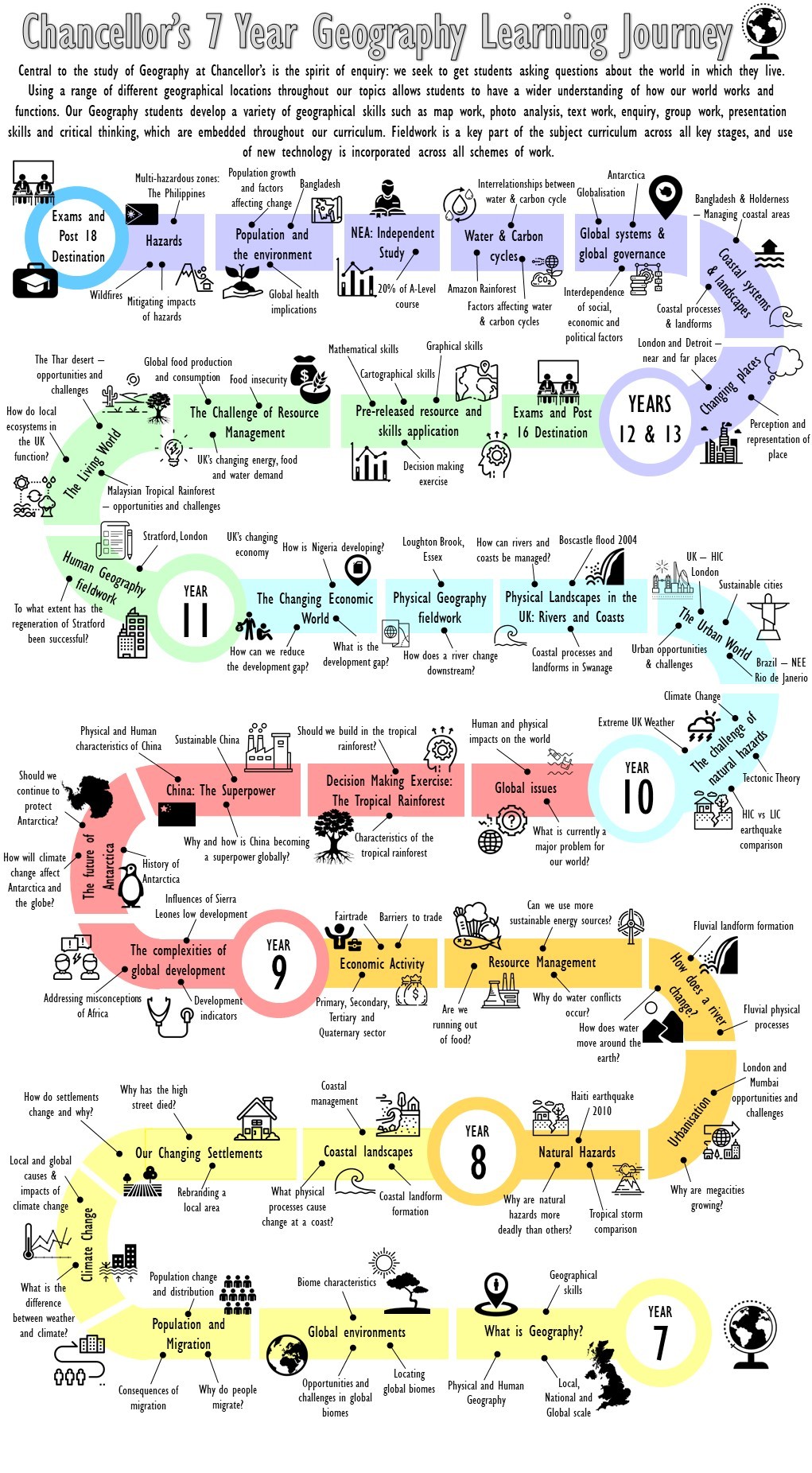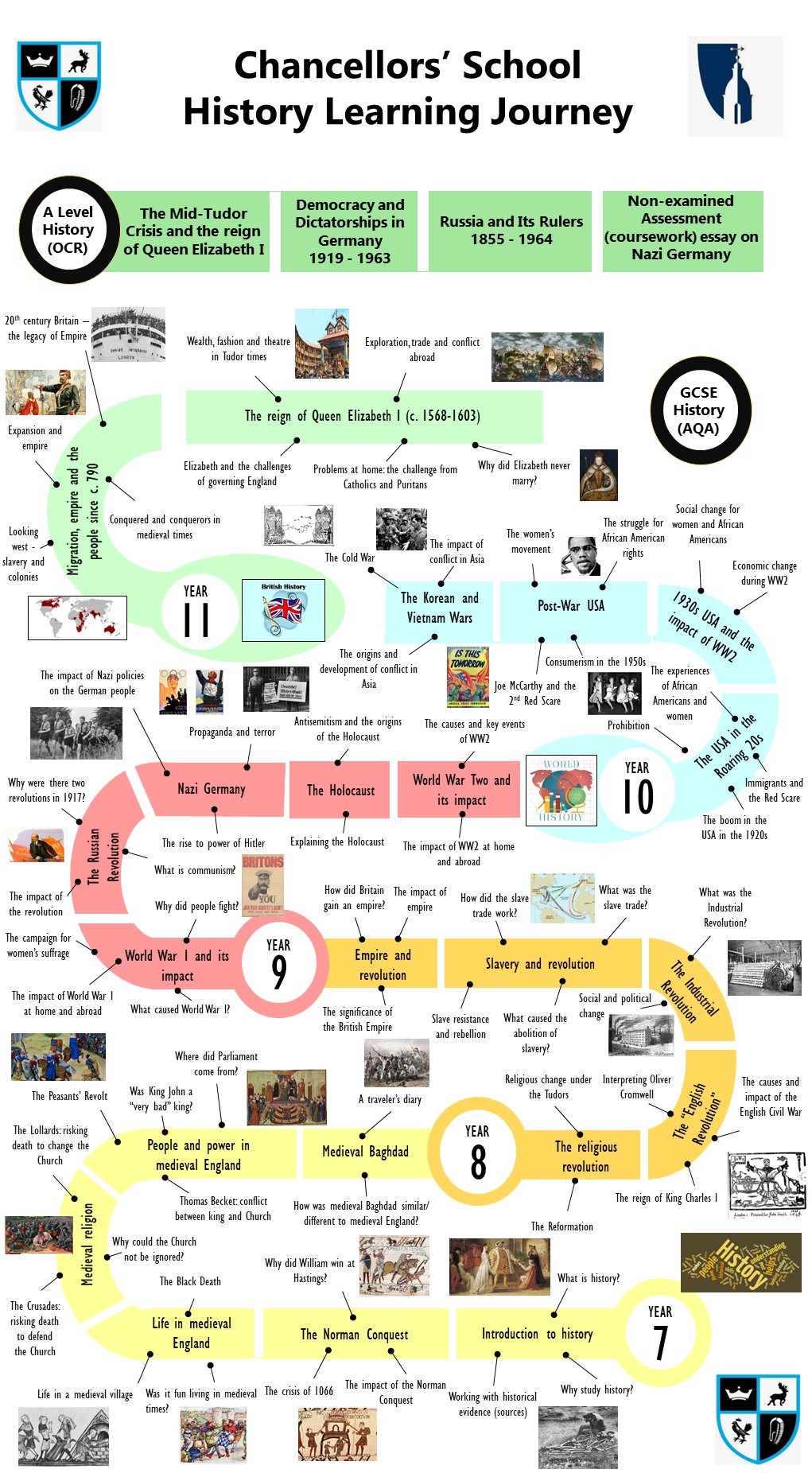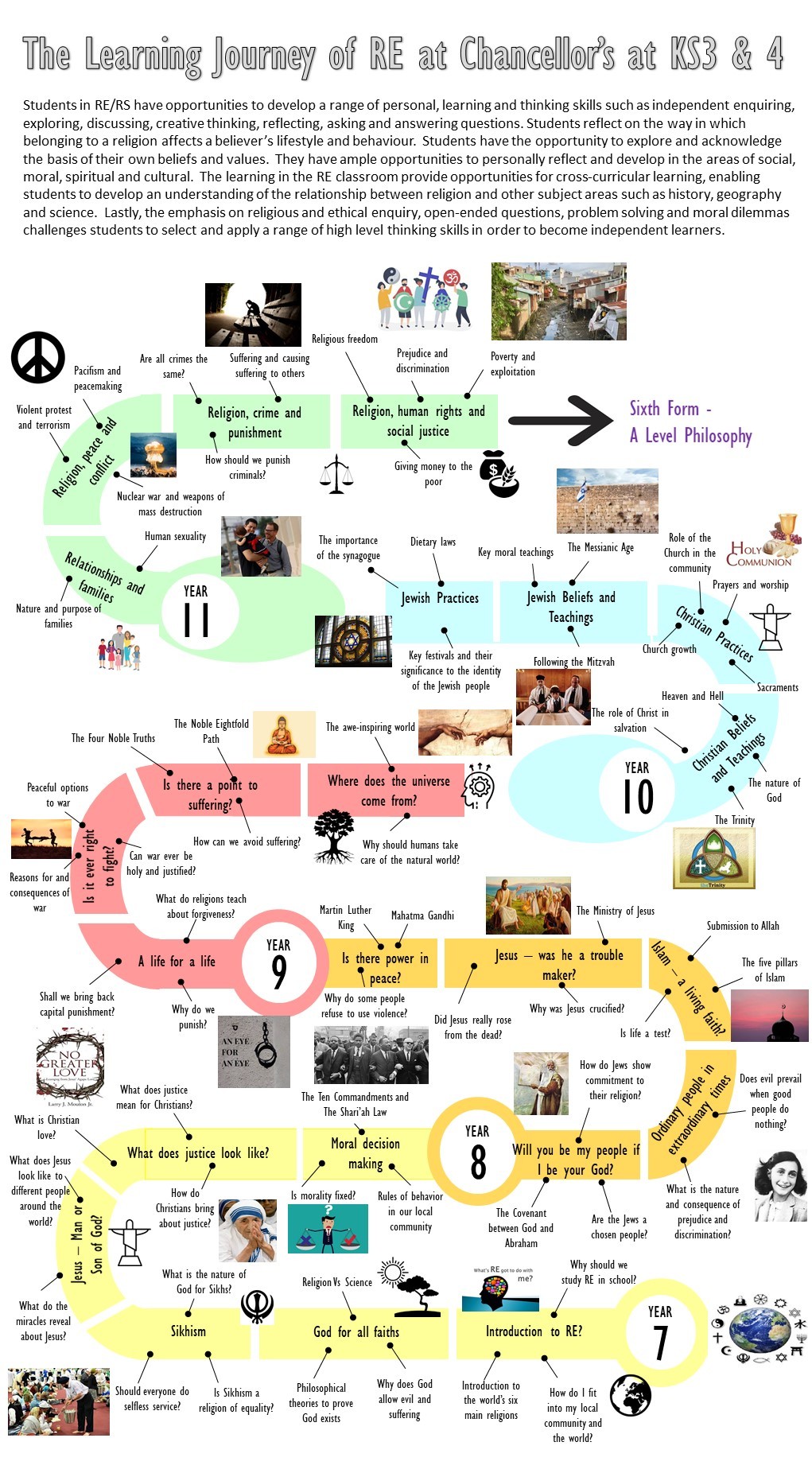Humanities
Introduction
The Humanities Faculty is comprised of the subjects of History, Geography and RE, with both Government and Politics and Philosophy and Ethics currently available in the Sixth Form. The Faculty is well-resourced with a highly-qualified team of subject specialists and a suite of 6 classrooms.
Students in Years 7 to 9 study History, Geography and RE. All three subjects are available at GCSE and classes are typically very popular.
For specific subject information please choose one of the options below.
Geography
Introduction
“Geography explains the past, illuminates the present and prepares us for the future. What could be more important than that?” Michael Palin 2009
Geography is highly relevant and engaging, being the only subject that looks at how all the elements of the earth interact and interconnect. Studying Geography will help you to see clearly and understand accurately, the environment that surrounds you.
The aims of the Geography department are to:
- Provide students with opportunities to evaluate and challenge the way in which their world operates
- Achieve their maximum academic potential through a dynamic and engaging programme of study
- Insist on high standards of behaviour and presentation
- Foster a regime of acknowledgement, praise and reward
- Provide extra-curricular opportunities which further students’ interest in the subject
Central to the study of Geography at Chancellor’s is the spirit of enquiry: we seek to get students asking questions about the world in which they live.
Geography students develop a variety of geographical skills such as map work, photo analysis, text work, enquiry, group work, presentation skills and critical thinking. Fieldwork is a key part of the subject curriculum across all key stages, and also incorporates the use of new technology.
Assessment for Learning is an integral aspect of teaching and learning within the department. Success criteria are shared with students, who regularly carry out assessment of their own work as well as that of their peers.
Key Stage 3
The Geography Department has designed an engaging KS3 curriculum using a wide range of resources. Students are taught in mixed-ability groups and lessons are well-planned and designed to differentiate for the needs of all learners.
During lessons, students will extend their knowledge of the world’s major countries and their physical and human features, as well as developing an understanding of how geographical processes interact to create distinctive human and physical landscapes that are constantly changing. Students will study processes which operate at a local, national and global scale and will develop their analytical and evaluative skills.
The following themes are taught through KS3:
- Physical geography processes, including: natural hazards, climate change, rivers and coasts
- Human geography processes, including: population and migration, urbanisation and development
- The interaction between physical and human processes and how they shape the world around us including climate change
- Geographical similarities, differences and links between places, with a focus on Africa and China
Students are expected to complete one formal assessment for each unit of work which is in the form of a written test. Students are expected to respond to teacher’s comments and questions on their homework, to extend and develop their skills in preparation for the formal assessment. There are opportunities for fieldwork within the local area and we are looking to provide opportunities for trips further afield.
Key Stage 4
Students follow the new AQA Geography specification, which is a linear GCSE course with all examinations being taken in that year. There is no controlled assessment for this course although students will conduct two days of fieldwork - one in an urban environment and another on rivers. There are no tiers of entry for this specification.
Paper 1: Living with the physical environment (35% of total GCSE)
- The challenge of natural hazards
- Physical landscapes in the UK
- The living world
Paper 2: Challenges in the human environment (35% of total GCSE)
- Urban issues and challenges
- The changing economic world
- The challenge of resource management
Paper 3: Geographical applications (30% of total GCSE)
- Issue evaluation – this is based on a pre-released resource which AQA will provide approximately 12 weeks before the exams
- Fieldwork skills
In both year 10 and 11, the course topics will alternate between those in Paper 1 and 2. This supports students’ ability to make links between the topics.
The progress of students is closely monitored with regular internal assessments throughout the year. Targeted revisions sessions are held throughout the two year GCCE to support students and provide opportunities for consolidating learning from classwork and homework, recap any missed work and carry out practice exam questions with the support of a teacher.
Key Stage 5
“There has never been a better or more important time to study geography. With growing interest in issues such as climate change, migration, environmental degradation and social cohesion, geography is one of the most relevant courses you could choose to study. Geographers are also highly employable.”Dr Rita Gardner Director of RGS-IBG (The Royal Geographical Society (with the Institute of British Geographers))
At Chancellor’s KS5 students study the A Level AQA Geography course. Students are required to complete four days of fieldwork. This takes place in Year 12 and this is to enable students to choose their focus for the independent geographical fieldwork investigation as well as to collect the relevant data for this. The structure of the course is outlined below:
Paper 1 – Physical geography (40% of total A Level)
- Section A - Water and carbon cycles
- Section B - Coastal systems and landscapes
- Section C - Hazards
Paper 2 – Human geography (40% of total A Level)
- Section A - Global systems and global governance
- Section B - Changing places
- Section C - Population and the environment
Paper 3 – Geographical fieldwork investigation (20% of total A Level)
- Geographical investigation
Extra-Curricular
Revision sessions and interventions are held throughout Years 10 and 11 to support students studying GCSE Geography. Sixth Form Geographers are encouraged to subscribe to Geography Review to develop their knowledge and understanding of the topic beyond that taught in the classroom. In addition, these students are encouraged to attend lectures and talks relevant to the A Level course at the Royal Geographical Society and the Geographical Association. Out-of-class learning is a fundamental part of the Geography curriculum at Chancellor’s School. At KS3 students engage in a range of local studies which develop fieldwork and research skills. Students taking GCSE Geography also undertake two days’ fieldwork to collect data about rivers and urban environments.
The Geography department also run an extra-curricular tour to Iceland every two years for those who have opted to study the subject at GCSE or A Level.
Useful Websites
- www.bbc.co.uk/
- www.oxfam.org.uk/education/resources/mapping_our_world/
- www.news.bbc.co.uk/1/shared/spl/hi/world/06/urbanisation/html/urbanisation.stm
- www.our-africa.org
- www.theguardian.com/global-development
- www.theguardian.com/uk/environment
- www.nationalgeographic.com/
- www.geography.learnontheinternet.co.uk/
History
Introduction
History students are encouraged to engage with the fascinating past of our country and the wider world. History is no longer a subject devoted to memorising key battles and dates; but rather equips students with knowledge and understanding necessary to succeed in an increasingly complex world, through the development of important analytical writing and oral skills, as well as the ability to debate and reach sophisticated judgements on historical questions.
Key Stage 3
The focus at Key Stage 3is the history of Britain, in the context of the wider world. Year 7 begins with an introduction to the study of History and some of its key skills and concepts, before starting to consider the big questions of British history, including 1066 and the Norman Conquest. Other topics studied in Year 7 are religion and life in medieval England, as well as beginning to work with historical evidence.
In Year 8 students learn about the dramatic Tudor and Stuart periods, as well as the huge changes brought about by the industrial revolution, before exploring big questions about the slave trade and the British Empire.
In Year 9, we focus more on European and world history, studying World War 1, the rise to power and regime of the Nazis in Germany and the impact of World War Two up to the present day, with a focus on the Middle East.
Key Stage 4
Students in Years 10 and 11 study the AQA specification. Paper 1 (Understanding the Modern World) comprises the study of dramatic decades in American history from 1920 to 1973, including: the boom and depression, the impact of World War Two, and the civil rights struggles of the 1950s and 1960s. We also study the Cold War in Asia, focusing on the Korean and Vietnam Wars.
Paper 2 (Shaping the Nation) concerns the history of Britain. We study the Elizabethan period and all the important conflicts and changes of the time, as well as a thematic study, exploring the development of power and democracy in the UK over a whole millennium, to the present day.
Internal assessments regularly take place, and mock examinations are held at the end of Year 10 and in November of Year 11. The progress of students is closely monitored throughout, with individuals being offered extra support as appropriate. Students are not grouped into sets for GCSE History.
Revision sessions are held in the lead up to the terminal exams in Year 11, and an intervention programme is in place from the start of Year 11 for those who are not on track to attain their target grade.
Key Stage 5
At A Level History, we study the OCR Specification. In Year 12, this involves the study of Germany from 1919 to 1963, from it’s disastrous defeat in World War 1 through the troubled Weimar Period, the rise of regime of the Nazis, and the impact and legacy of German defeat in World War 2. We also study the Tudor period of British history from 1547 to 1603, analysing the changes, conflicts and crises under Edward VI, Mary and Elizabeth I.
Year 13 students learn about a hundred years of Russian history, from the start of the reign of Tsar Alexander II, through the 1905 and communist revolutions, the regimes of Lenin, Stalin and finally Khrushchev. The exam requires students to answer questions about the big themes of Russian history, as well as to engage with historical interpretations.
Year 13 students research and write an independent piece of historical writing (coursework), focusing on either Nazi Germany or the reign of Elizabeth I.
Progress is regularly assessed through essays and knowledge tests, and a full mock examination is held at the end of Year 12. AS Level History is not currently offered.
Extra-Curricular
The History department runs trips in Years 9 and 12.
Year 9 students visit the battlefields of World War 1 to learn more about the experience of soldiers and to explore some of the key questions of the conflict.
Year 12 A’ Level students visit Hatfield House to explore the childhood and career of Elizabeth I and also have the opportunity to visit Berlin, to study in greater depth the history of Weimar, Nazi and Cold War-era Germany.
In the near future, we plan to offer further trips in Year 11 (to the Houses of Parliament) and at Key Stage 3.
Useful Websites
A Level:
http://www.ocr.org.uk/qualifications/as-a-level-gce-history-a-h105-h505-from-2015/
GCSE:
http://www.aqa.org.uk/subjects/history/gcse/history-8145
http://www.bbc.co.uk/education/subjects/zj26n39
http://www.johndclare.net/
Key Stage 3:
http://www.bbc.co.uk/education/subjects/zk26n39
RE
Introduction
“When I admire the wonders of a sunset or the beauty of the moon, my soul expands in the worship of the creator.” Mahatma Gandhi
“Just as a candle cannot burn without fire, men cannot live without a spiritual life.” Buddha
The aims of the Religious Education curriculum are to enable students to become:
- Successful learners who enjoy learning, make progress and achieve
- Confident individuals who are able to live safe, healthy and fulfilling lives
- Responsible citizens who make a positive contribution to society
RE at Chancellor’s offers students opportunities to reflect on their personal beliefs, values and commitments and plays an important part in their spiritual and moral development. RE develops young people’s awareness of the importance and influence of religions, beliefs, worldviews and experience on individuals, their families, communities and cultures. Students gain invaluable insights into issues which affect us all in society, such as equality and justice. This knowledge will increase understanding and appreciation of the world today, enabling students to become responsible citizens who make informed choices in our diverse society and global community.
Students will have studied aspects of all of the six principal world religions, with reference to worldviews such as Humanism, by the end of KS3. They are always encouraged to be considerate and empathetic to the beliefs, values and traditions of others. Where appropriate, students are also encouraged to learn and explore topics from the viewpoint of their own faith community, if they have one.
Units of Study
Key Stage 3
RE pupils have one hour of learning each week:
Year 7:
- Introduction to RE
- God for all faiths or none?
- What is the nature of God in Sikhism?
- Jesus – Man or son of God?
- What does justice mean to Christians?
- How do we know right from wrong?
Year 8:
- Judaism - Will you be my people if I will be your God?
- Inspirational people - How do ordinary people live in extraordinary times?
- What is the nature of God in Islam?
- Jesus – Was he a troublemaker?
- Life after death - Moving on up or going round in circles?
- Pacifism - Is there power in peace?
Year 9:
- Capital punishment - A life for a life?
- Buddhism - Does suffering have a point?
- War and peace - Is it ever right to fight?
- Science vs religion - Where does the universe come from?
- Stewardship - Do animals have right?
Homework is set once a week. Students are welcome to attend the ‘RE Drop-In/Homework Club’ every lunchtime, either for help with homework or just for a chat about things they have been learning in their lessons or wider events in the world.
Assessment for learning
Students will check and improve all tasks completed in class and at home using our ‘Green Pen’ policy. Answers will be discussed and shared so that students are able to reflect on and evaluate their own work so that they know how to improve and make progress. This is an integral part of RE teaching in Chancellor’s as it fosters independence and a truly enquiring growth mindset. Formal assessments take place at the end of each topic which will be teacher marked. Students will then have the opportunity of whole class feedback and to improve their work, again using our ‘Green Pen’ policy.
Key Stage 4 - GCSE
Year 10:
Component 1: The study of religions: Beliefs, teachings and practices of two religions – Christianity and Judaism.
Year 11:
Component 2: Thematic studies of four themes – Relationships and families; religion, peace and conflict; religion, crime and punishment; and religion, human rights and social justice.
Students have two and a half hours of lessons per week in Year 10, and three hours of lessons each week in Year 11. Homework is set twice weekly and students are formally assessed at the end of each topic, to prepare them for their GCSE exam.
Exam Board and Syllabus number: AQA Religious Studies A, Syllabus number 8062.
Students will sit two papers at the end of Year 11, each of which is 1 hour 45 minutes and worth 50% of the GCSE.
A successful RS student will have developed a wide range of transferable skills and qualities that will be extremely useful in KS5, the workplace and society in general, such as listening and speaking, working well in a group, discussing/debating, thinking, reflecting, justifying, analysing and evaluating.
Extra-curricular
- Homework club
- Drop-in club
- Games club
- Poetry writing
- Trips to places of worship




